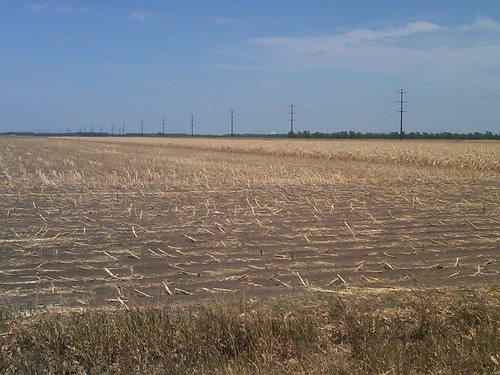
This is a corn field that has either been put up as hay or chopped for silage. The brown strips are corn that has been left for insurance adjustors to verify loss. Normally the corn would still be green rather than brown. This field is only 80 miles from where we farm.
The corn yields are being hampered by the high temperatures even with adequate water. During pollination the pollen is damaged from the high heat and reduces the kernels that will be on each ear of corn. With temperatures in the low 90's at midnight it's hard for corn to release the water it used earlier in the day to transport nutrients from the soil, this also hampers yields.
Our irrigated soybeans need .30 inches of water a day, but they are getting sacrificed some right now to keep the water on the corn. They are a very resilient crop and if we can get some rain soon they will be fine, the more critical time for them to have water will be in a few weeks when they start setting and filling pods. So there is still time to water them to make a respectable yield.
On a drought tour of extreme southwest Kansas Governor Brownback he was quoted in the news saying. “There’s been less rainfall this year than in the peak of the 1930s Dust Bowl with the same heat and wind. Hats off to the producers for being such good stewards.” This shows just how extreme the drought is in the south western portion of the state. It is also a testament to farming practices that have been implementing since then, we no longer bury the stubble leaving bare soil vulnerable to wind.

1 comment:
This is too bad to observe such fields, really. I hope the nature will be more kind next year.
http://casino.imcredo.com/
Post a Comment